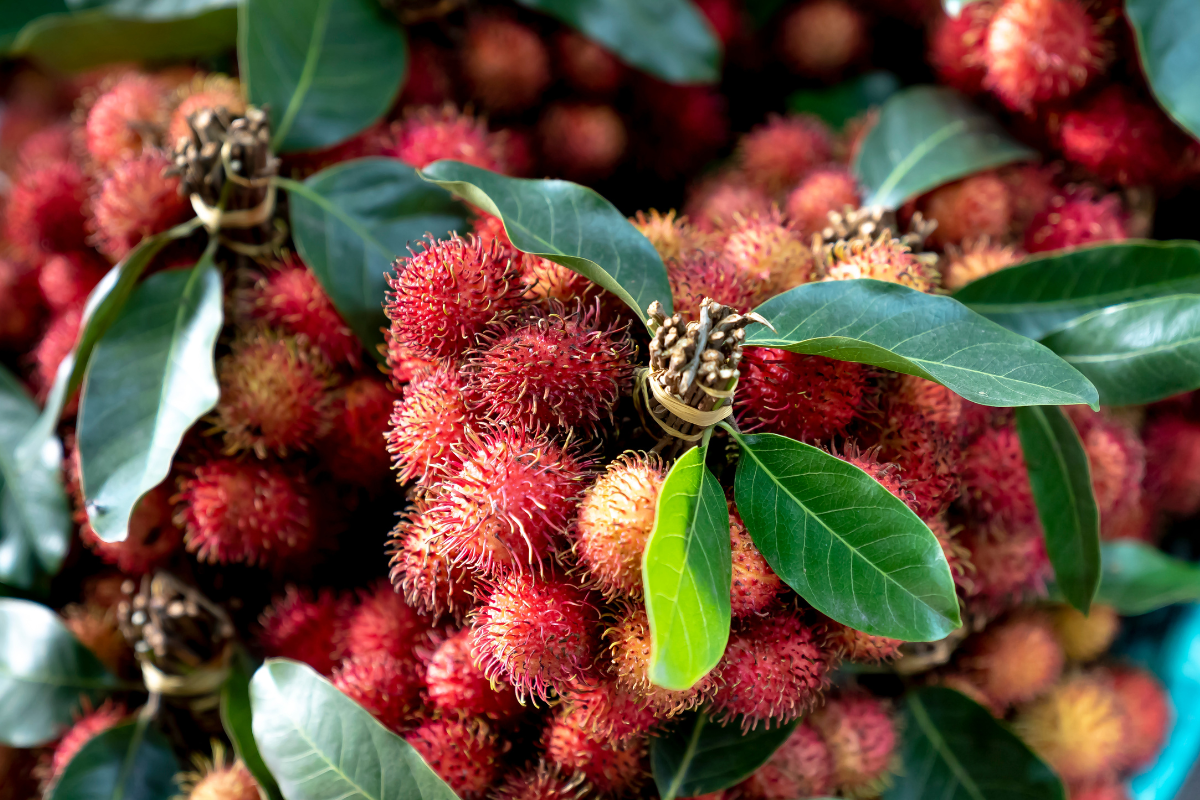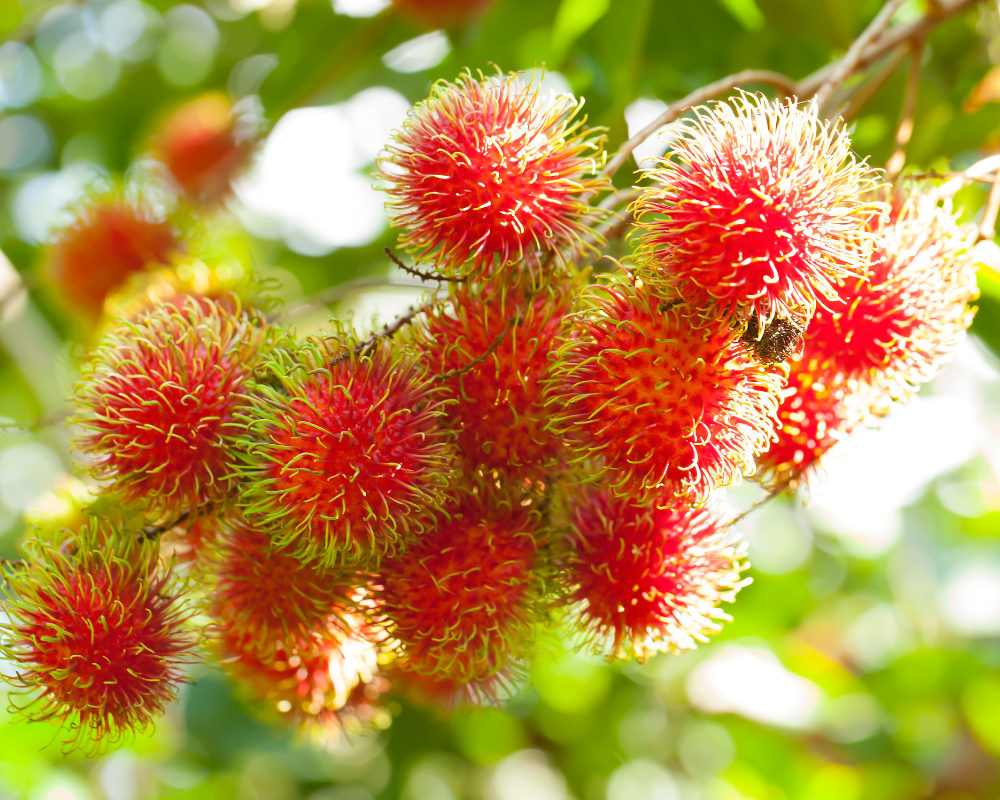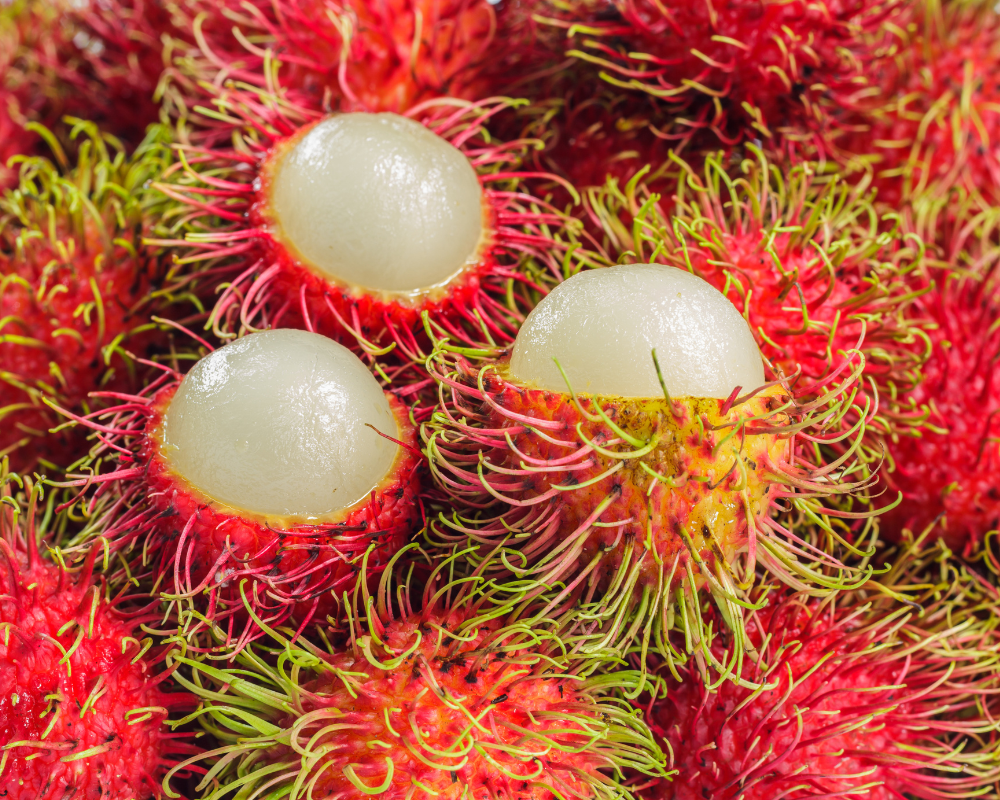Can Dogs Eat Rambutan? Must Know!
Can Dogs Eat Rambutan? Must Know!

Vet Reviewed

By: Sarah Hodgson
October 26, 2023
- Posted in DogsCan Dogs Eat
Table of Contents
Rambutan a tropical fruit closely related to lychee isn't the everyday fruit. It's been actually growing in popularity and adventurous foodies love it.
Imagine you're sitting eating this tropical fruit and your dog comes begging to give him some. Can you give him Rambutan? In this post, we will explore just that and the potential benefits and risks associated with it.
So let's dive in!
What Is Rambutan?
Before we dive into whether dogs can eat rambutan, let's first understand what this fruit is.
There is a good chance that you never heard of rambutan. Most people don't know of it except those living in the tropical countries it grows in.
Rambutan is a small, round fruit that belongs to the soapberry family. It is similar in appearance to lychee, with a spiky red or yellowish exterior. Once you peel away the skin, you will find a translucent, juicy flesh that is sweet and slightly acidic in taste. Rambutan is rich in vitamins C and A, as well as several minerals such as potassium and iron.
People tend to say that the smell of rambutan is a combination of vanilla, rose, and honey.
Can Dogs Eat Rambutan?
Not all human foods are safe for dogs. So is rambutan safe for dogs to eat?
Yes, as long as it's prepared properly. The flesh of rambutan is safe for dogs to eat, but the skin and seeds are potential risks. The hairy skin can be difficult for dogs to digest and may cause gastrointestinal issues such as vomiting or diarrhea. That's why it's recommended not to feed your dog this fruit even though it's safe for consumption.
So you probably see why we recommend not feeding your dog this tropical fruit. It needs to be prepared correctly before feeding it to your dog which some owners are not sure how to properly do.

Does Rambutan Have Health Benefits For Dogs?
So now that we know that the flesh of rambutan is safe for dogs, you'll be amazed to know that it also contains some health benefits as well.
Some of the benefits include:
- Vitamins and Minerals: Rambutan is a good source of several essential vitamins and minerals, including vitamin C, vitamin A, potassium, and manganese. These nutrients are important for overall health and immune function in humans.
- Antioxidants: Rambutan contains antioxidants such as flavonoids, phenolic compounds, and vitamin C, which help neutralize harmful free radicals in the body and may reduce the risk of chronic diseases.
- Fiber: Rambutan is a source of dietary fiber, which aids in digestion and can help regulate bowel movements.
- Hydration: Like many fruits, rambutan has a high water content, which can contribute to overall hydration when consumed as part of a balanced diet.
- Low in Fat: Rambutan is naturally low in fat, making it a healthier option compared to high-fat snacks.
Overall these nutrients help boost the immune system, improve skin and a dog's coat conditions, and promote healthy digestion. However, it's important to note that there are other dog-friendly fruits and vegetables that can provide similar benefits without the potential risks associated with rambutan.
The Risks Of Feeding Rambutan To Dogs
So yes rambutan is safe but there are many risks associated with the tropical fruit if it's not prepared correctly. The main two risks are the hairy skin and the seeds. Both pose a big choking hazard. Some of the other risks include:
- High Sugar Content: Rambutan is relatively high in natural sugars, which can lead to gastrointestinal upset or contribute to weight gain and obesity in dogs if consumed in large quantities.
- Potential Choking Hazard: The large seed or pit inside the rambutan fruit could pose a choking hazard to dogs, especially small breeds or those prone to swallowing food quickly without chewing thoroughly.
- Allergic Reactions: While rare, some dogs may be allergic to rambutan or other fruits in the same botanical family (Sapindaceae), which could lead to allergic reactions such as itching, swelling, or gastrointestinal distress.
- Gastrointestinal Upset: Dogs may experience digestive issues such as diarrhea, vomiting, or abdominal discomfort if they consume too much rambutan or if their digestive systems are sensitive to new foods.
- Toxicity Concerns: While rambutan itself is not considered toxic to dogs, it's essential to avoid feeding them the skin or peel, as these parts may contain residues of pesticides or other chemicals that could be harmful if ingested.
Can a Dog Be Allergic to Rambutan?
Just like humans, dogs can develop allergies to certain foods, including fruits. While rambutan is not considered a common allergen for dogs, it's still possible for individual dogs to have adverse reactions.
If you notice any signs of an allergic reaction, such as itching, swelling, or difficulty breathing, discontinue feeding rambutan immediately and consult with your veterinarian.

Can Rambutan Cause Bloat?
Bloat is a serious condition characterized by the stomach filling with gas, fluid, or food, and then twisting, which can be life-threatening if not promptly treated.
However, any food, including rambutan, has the potential to contribute to bloat indirectly if consumed excessively or too quickly. Eating large quantities of any food, especially those high in sugars or fibers like rambutan, can lead to gastrointestinal upset or discomfort in dogs, potentially increasing the risk of bloat. That's why feeding your dog rambutan in moderation is so important.
Do Dogs Like Rambutan?
This is a funny question, why?
Because dogs have different preferences when it comes to food, and their tastes can vary widely. Some dogs may be curious about rambutan and eager to try it, while others may show no interest at all. Just like us humans are all different dogs have their own personalities too. Some may like it others may hate it. So observe your dog when feeding the flesh of the fruit and see how they react.
How Much Rambutan Can Your Dog Eat?
If you decide to share rambutan with your dog, it's crucial to do so in moderation. Veterinarians recommend feeding your dog not more than 10% of their daily calorie intake on rambutan. That is a very small amount.
Treat rambutan as an occasional snack rather than a staple in their diet. Start by offering small, bite-sized pieces and monitor your dog's reaction. If they tolerate rambutan well, you can gradually increase the amount given, always being mindful of their overall calorie intake.
Remember that dogs have different digestive systems and nutritional needs compared to humans.
How to Safely Feed Rambutan to Your Dog
If you want to share a small amount of rambutan flesh with your dog, there are some precautions you have to take to avoid the risks.
- Remove the Peel and Seed: Peel the rambutan and remove the seed or pit inside before offering it to your dog. The peel and seed can pose a choking hazard and may contain residues of pesticides or other chemicals that could be harmful to your dog.
- Offer Small Portions: Start by offering your dog a small piece of rambutan to see how they react. Monitor for any signs of allergic reactions or digestive upset.
- Moderation is Key: Rambutan should be fed to dogs in moderation as an occasional treat rather than a staple food. Too much fruit, including rambutan, can lead to gastrointestinal upset or contribute to weight gain due to its sugar content.
- Watch for Allergic Reactions: Keep an eye out for any signs of allergic reactions in your dog, such as itching, swelling, or gastrointestinal distress, after consuming rambutan.
- Avoid the Pit: Ensure that your dog does not ingest the seed or pit of the rambutan, as it could pose a choking hazard or cause gastrointestinal obstruction.
- Introduce Gradually: If your dog has never eaten rambutan before, introduce it gradually into their diet to gauge their tolerance and prevent any potential digestive issues.

My Dog Ate Rambutan, What Will Happen to Him?
If your dog accidentally consumes rambutan, it's important to stay calm everything will be okay. Simply observe their behavior and health closely. Rambutan is unlikely to cause severe harm. As long as your dog ate the flesh he will be fine as it is totally safe for dogs.
However, if your dog happens to consume the seeds or skin and you see symptoms such as gastrointestinal distress such as vomiting, diarrhea, or loss of appetite. Take your dog to the vet immediately. They will be able to provide appropriate guidance and advice based on your dog's specific situation.
What Happens If a Dog Eats a Rambutan Seed?
While the flesh of the rambutan fruit is safe for dogs to consume, the same cannot be said for the seed. Rambutan seeds are not only hard and difficult to digest, but they can also pose a choking hazard to dogs.
If a dog ingests a rambutan seed, it may cause gastrointestinal blockage or other digestive issues. Therefore, it is crucial to remove the seeds before offering rambutan to your four-legged friend.
The Bottom Line
So there you have it, while rambutan may be a delicious and nutritious fruit for humans, it can be for dogs also. Just make sure that the hairy skin and seeds are removed as they pose potential risks to dogs.
Always consult with your veterinarian before introducing any new foods into your dog's diet and prioritize their well-being above all else. Till next time!

Subscribe to Petfluence!
Get updates on the latest posts and more from Petfluence straight to your inbox.